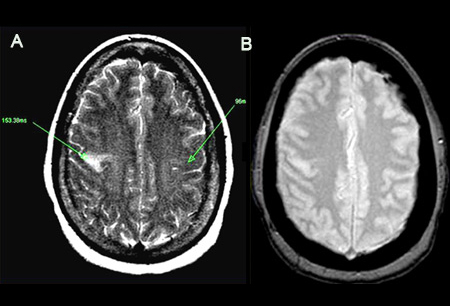Summary
Definition
History and exam
Key diagnostic factors
- vision loss or visual field deficit
- weakness
- aphasia
- ataxia (impaired coordination)
Other diagnostic factors
- history of transient ischemic attack (TIA)
- sudden onset of symptoms
- negative symptoms (i.e., loss of function)
- altered sensation
- headache
- diplopia
- sensory loss
- dysarthria
- "Crossed" syndromes
- gaze paresis
- arrhythmias, murmurs, or pulmonary edema
- vertigo/dizziness
- nausea and/or vomiting
- neck or facial pain
- miosis, ptosis, and facial anhidrosis (hemilateral)
- altered level of consciousness/coma
- confusion
Risk factors
- hypertension
- older age
- sickle cell disease
- family history of stroke
- history of transient ischemic attack (TIA)
- history of ischemic stroke
- cerebral microbleeds
- smoking
- diabetes mellitus
- atrial fibrillation
- comorbid cardiac conditions
- carotid artery stenosis
- intracranial atherosclerosis (ICAS)
- dyslipidemia
- lower levels of education
- ethnicity
- poor diet and nutrition
- low birth weight
- physical inactivity
- obesity
- alcohol misuse
- estrogen-containing therapy
- migraine
- severe obstructive sleep apnea
- long sleep duration and poor sleep quality
- illicit drug use
- hyperhomocysteinemia
- elevated lipoprotein(a)
- hypercoagulable states
- elevated C-reactive protein
- aortic arch plaques
- patent foramen ovale
- air pollution
- e-cigarettes
- Infections (e.g., COVID-19) and vaccine-induced thrombotic thrombocytopenia
Diagnostic tests
1st tests to order
- CT head
- MRI brain
- CT angiography or magnetic resonance angiography
- CT or MRI perfusion
- serum glucose
- serum electrolytes
- serum BUN and creatinine
- cardiac enzymes
- ECG
- CBC
- coagulopathy screen
Tests to consider
- serum toxicology screen
- infection screen
- genetic testing
- CXR
- CT or magnetic resonance or digital subtraction venography
- carotid ultrasound
- echocardiogram
- transcranial Doppler ultrasound
- conventional (invasive) angiography
Treatment algorithm
Contributors
Authors
David Wang, DO, FAHA, FAAN
Professor of Neurology
Co-Director
Petznick Stroke Center
Neurovascular Division
Barrow Neurological Institute
Phoenix
AZ
Disclosures
DW received honorarium from Boehringer Ingelheim for lectures on the use of thrombolytics for acute ischemic stroke. He has also received honorarium from Amgen and Zhongmei Huadong Pharmaceuticals for speaking. DW was Chair, Stroke Section of the American Academy of Neurology, 2017-2019. He was Chair, Quality and Safety Subcommittee of the American Academy of Neurology (term ended June 2018). DW is an author of references cited in this topic.
Yi Dong, MD, PhD
Department of Neurology
Huashan Hospital
Fudan University
Shanghai
China
Disclosures
YD declares that she has no competing interests.
Yilong Wang, MD, PhD
Professor of Neurology
Deputy Director, Department of Neurology
Beijing Tiantan Hospital, Capital Medical University
Beijing
China
Disclosures
YW declares that he has no competing interests.
Acknowledgements
Dr David Wang, Dr Yi Dong, and Dr Yilong Wang would like to gratefully acknowledge Dr George Ntaios and Dr Alireza Minagar, the previous contributors to this topic.
Disclosures
GN is on the advisory boards for, and has received honoraria, speaker fees, and research support from: Amgen, Bayer, Boehringer-Ingelheim, BMS/Pfizer, Elpen, Galenica, Medtronic, Sanofi, and Winmedica. AM declares that he has no competing interests.
Peer reviewers
Julien Morier, MD
Neurology Registrar
Neurology Service
Centre Hospitalier Universitaire Vaudois (CHUV)
Lausanne
Switzerland
Disclosures
JM declares that he has no competing interests.
Louis R. Caplan, MD
Lecturer in Neurology
Hospital Chief
Cerebrovascular/Stroke Division
Beth Israel Deaconess Medical Center
Division of Cerebrovascular/Stroke
Boston
MA
Disclosures
LRC declares that he has no competing interests.
Tony Rudd, MD
National Clinical Director
Stroke NHS England
Professor, Stroke Medicine
Kings College London
Chair, Intercollegiate Stroke Working Party
Royal College of Physicians
London
UK
Disclosures
TR declares that he has no competing interests.
Use of this content is subject to our disclaimer
